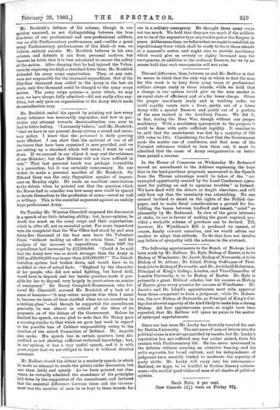On Tuesday Mr. Winston Churchill reopened the discussion in a
speech of no little debating ability; but, in our opinion, he dwelt too much on the army corps and their organisation, which is, after all, not an essential point. Far more important were his complaint that the War Office had stood by and seen thirty-five thousand of the best men leave the Volunteer Force "without making an effort to retain them," and his analysis of the increase in expenditure. Since 1897 the expenditure had increased by £12,000,000. " Could it be said that the Army now was as much stronger than the Army in 1897 as £30,000,000 was larger than £18,000,000? " The linked- battalion system had broken down, and would have to be modified in view of actual facts. " England by the character of her people, who did not mind fighting, but bated drill, would have to depend, and her insular position made it pos- sible for her to depend, very largely in great crises on armies of emergency." Sir Henry Campbell-Bannerman, who fol- lowed Mr. Churchill, accused Mr. Brodrick of a lack of a sense of humour—" it may rather surprise him when I name it, because we have all been startled when we see ourselves in a looking-glass "—but though he supported the amendment generally, he was almost as critical of the ideas of its proposers as of the doings of the Government. Before he finished his speech, we are glad to note that Sir Henry gave a warning similar to that which we gave last week in regard to the possible loss of Cabinet responsibility owing to the creation of the mixed, Committee of Defence. Mr. Asquith also spoke. His speech has in certain quarters been dis- credited as not showing sufficient technical knowledge; but, in- our opinion, it was a very useful speech, and it is with great regret that we are obliged to leave it without detailed comb:tent.










































 Previous page
Previous page